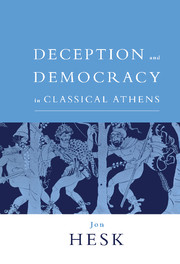Book contents
- Frontmatter
- Contents
- Preface
- Prologue
- 1 Deception and the rhetoric of Athenian identity
- 2 Deceiving the enemy: negotiation and anxiety
- 3 Athens and the ‘noble lie’
- 4 The rhetoric of anti-rhetoric: Athenian oratory
- 5 Thinking with the rhetoric of anti-rhetoric
- Epilogue
- Bibliography
- Index locorum
- General index
Epilogue
Published online by Cambridge University Press: 22 September 2009
- Frontmatter
- Contents
- Preface
- Prologue
- 1 Deception and the rhetoric of Athenian identity
- 2 Deceiving the enemy: negotiation and anxiety
- 3 Athens and the ‘noble lie’
- 4 The rhetoric of anti-rhetoric: Athenian oratory
- 5 Thinking with the rhetoric of anti-rhetoric
- Epilogue
- Bibliography
- Index locorum
- General index
Summary
Among today's adept practitioners, the lie has long since lost its honest function of misrepresenting reality.
Athenian democratic culture sought to locate deceit elsewhere; for example in the upbringing, political organisation and military customs of the Spartan enemy. According to the Athenian imaginary, the Spartans exhibited and promoted a category of communication and behaviour which ran counter to the lineaments of hoplite excellence and inherent excellence. At the same time however, we have seen that the Athenian representation of military deceit was always open to public re-negotiation and anxious theoretical consideration of its problematic social and ethical connotations and consequences. It seems that the ideology of ‘la belle mort’ could countenance the welding of mētis and/or apatē to ideal hoplite agency. Thus Vidal-Naquet's influential description of apatē has to be framed with a much more nuanced modelof deceit's negotiability in public projections of identity and ideal military endeavour.
The problematisation of military trickery at Athens perhaps stems from the way in which the city puts deceit to work ideologically. The Athenian is to define himself in opposition to the enemy who is ‘other’ because that enemy trains and prepares for military deceit. How is this opposition to be maintained if the ‘ideal’ Athenian citizen entertains such training himself? Only the ephebe can do this temporarily.
- Type
- Chapter
- Information
- Deception and Democracy in Classical Athens , pp. 292 - 298Publisher: Cambridge University PressPrint publication year: 2000



